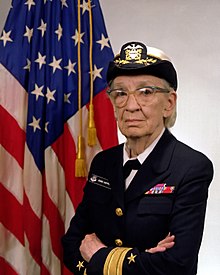Grace Hopper
| Grace Murray Hopper | |
|---|---|

Rear Admiral Grace M. Hopper, 1984
|
|
| Nickname(s) | "Amazing Grace" |
| Born |
December 9, 1906 New York City, New York, U.S. |
| Died | January 1, 1992 (aged 85) Arlington, Virginia, U.S. |
| Place of burial | Arlington National Cemetery |
| Allegiance |
|
| Service/branch |
|
| Years of service | 1943–1966, 1967–1971, 1972–1986 |
| Rank |
|
| Awards |
|
Grace Brewster Murray Hopper (née Murray; December 9, 1906 – January 1, 1992) was an American computer scientist and United States Navy Rear Admiral. In 1944, she was one of the first programmers of the Harvard Mark I computer and invented the first compiler for a computer programming language. She popularized the idea of machine-independent programming languages, which led to the development of COBOL, one of the first high-level programming languages. She also popularized use of the term bug (already established in other technical contexts) in reference to computer software or hardware design failures.
Owing to her accomplishments and her naval rank, she was sometimes referred to as "Amazing Grace". The U.S. Navy Arleigh Burke-class guided-missile destroyer USS Hopper was named for her, as was the Cray XE6 "Hopper" supercomputer at NERSC.
On November 22, 2016, she was posthumously awarded the Presidential Medal of Freedom by President Barack Obama.
Hopper was born in New York City. She was the eldest of three children. Her parents, Walter Fletcher Murray and Mary Campbell Van Horne, were of Dutch and Scottish descent, and attended West End Collegiate Church. Her great-grandfather, Alexander Wilson Russell, an admiral in the US Navy, fought in the Battle of Mobile Bay during the Civil War.
...
Wikipedia
